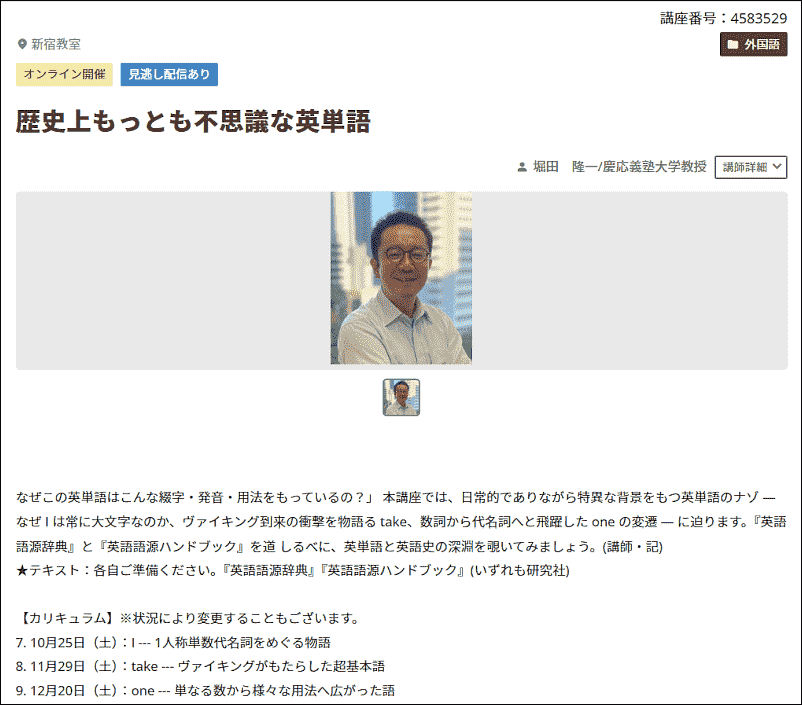2025-12-11 Thu
■ #6072. 12月20日(土),朝カル講座の秋期クール第3回「one --- 単なる数から様々な用法へ広がった語」が開講されます [asacul][notice][one][numeral][indefinite_pronoun][kdee][hee][etymology][lexicology][spelling_pronunciation_gap][hel_education][helkatsu][prop_word][pronoun]

今年度,毎月1度の朝日カルチャーセンター新宿教室での英語史講座「歴史上もっとも不思議な英単語」シリーズも,これまで順調に進んでいます.来週末の12月20日(土),年内では最後となる,秋期クールの第3回(今年度通算第9回)が開講される予定です.今回は,一見すると何の変哲もない one という単語に注目します.
ただの数詞にすぎない,といえばそうなのですが,実はただものではありません.
・ one の綴字と発音の乖離
・ 不定冠詞 a/an への発達
・ 語源的関連語 any, alone, atone, only, other, none, no
・ 複合語 someone, anyone no one
・ 1つなのに複数形 ones がある?
・ 「屈折形」の one's, oneself
・ 代名詞としての one
・ 支柱語としての one
・ one of . . . の語法
one が数詞から尋常ならざる発達を遂げ,問題がありすぎる語へと変質してきたらしいことが見て取れるのではないでしょうか.むしろ卑近で高頻度で当たり前の単語だからこそ,様々な用法を生み出してきたといえます.講座では,この小さくも大きな語彙項目に,英語史の観点から90分じっくり向き合います.
講座への参加方法は,前回同様にオンライン参加のみとなっています.リアルタイムでのご参加のほか,2週間の見逃し配信サービスもありますので,ご都合のよい方法でご受講ください.開講時間は 15:30--17:00 です.講座と申込みの詳細は朝カルの公式ページよりご確認ください.
(以下,後記:2025/12/13(Sat)))
本講座の予告については heldio にて「「#1658. 12月20日の朝カル講座は one --- 単なる数から様々な用法へ広がった語」」としてお話ししています.ぜひそちらもお聴きください.
・ 寺澤 芳雄(編集主幹) 『英語語源辞典』新装版 研究社,2024年.
・ 唐澤 一友・小塚 良孝・堀田 隆一(著),福田 一貴・小河 舜(校閲協力) 『英語語源ハンドブック』 研究社,2025年.
2025-06-30 Mon
■ #5908. 支柱語 one の用法を MED で確認する [med][prop_word][pronoun][noun][countability]
昨日の記事「#5907. 支柱語 one の用法を OED で確認する」 ([2025-06-29-1]) に引き続き,支柱語 (prop_word) としての one の使用の歴史に迫る.今回は MED で on (pron.) を引いてみた.
5a 以下の語義がおおよそ支柱語としての用法に相当するが,その現われ方は様々であり,どのような原理で区分し整理すればよいのかは,なかなか難しい問題である.典型的な例とおぼしきものは,とりわけ 5b 以下のものだろうか.5b で挙げられている例は,いずれも後期中英語期からのものである.以下に引用する.
c1380 Firumb.(1) (Ashm 33)251: A fair knyȝt a was to see, a iolif on wyþ oute lak.
(a1393) Gower CA (Frf 3)5.519: Thanne hath he redi his aspie..A janglere, an evel mouthed oon, That sche ne mai nowhider gon..That he ne wol it wende and croke.
(c1395) Chaucer CT.Mch.(Manly-Rickert)E.1552: I haue the mooste stedefast wyf, And eek the mekeste oon that bereth lyf.
c1450(?a1400) Wars Alex.(Ashm 44)40: Þe kyng..was a clerke noble, Þe athelest ane of þe werd.
c1450(?a1400) Wars Alex.(Ashm 44)586: Anoþer barne..I of my blode haue, Ane of my sede.
1591(?a1425) Chester Pl.(Hnt HM 2)53/259: Into my chamber I will gonne tyll thys water, soe greate one, bee slaked through thy mighte.
文脈上,直前にある可算名詞を受けるという支柱語 one の典型的な用法が確認できる.挙げられている例からは,後期中英語期の発達と考えられるが,その種はもう少し早い段階からあったと考えてよいだろう.
現代英語の支柱語 one をめぐる問題は,それが多様な用法と複雑な制限を示す点で,記述が難しそうであり,歴史的な調査はさらにややこしそうだ.支柱語 one ついては,昨日,heldio/helwa リスナーの川上さんが note にて「"Do you have a red one?" の one は何ですか?【素朴な疑問に答えよう2】」として関連記事を書いているので,参照されたい.
2025-06-29 Sun
■ #5907. 支柱語 one の用法を OED で確認する [oed][prop_word][pronoun][noun][countability]
昨日の記事「#5906. 支柱語 (prop word) の「支柱」とは?」 ([2025-06-28-1]) では,My family is a large one. の one の用法に触れた.今回は,支柱語 one の起源について,OED の記述を確認したい.
OED の one (ADJECTIVE, NOUN, & PRONOUN) より PRONOUN V のセクションが,支柱語の用法に相当する.同セクション内で下位区分された項目のうち,とりわけ典型的な支柱語としての用法に関係する V. 13 に掲げられている最初例をいくつか挙げておこう.
V. As substitute for a noun or noun phrase.
V. 13. Following a determiner such as the, this, that, yon, any, each, every, many (a), other, such (a), what (a), what kind of (a), which, or (in certain phrases) following a, or (from Middle English onwards) following an ordinary adjective (occasionally also a noun used attributively) preceded by any of these or (in plural) alone.
V.13.a. A thing or person (or, in plural, things or persons) of the kind in question (as indicated by the context).
Down to the late Middle English period one was probably felt as an emphatic pronoun, intensifying the determiner with which it was coupled. In modern English it is generally an empty pro-form (sometimes referred to as a 'prop-word'), and the addition of one or ones often serves to specify number: cf. 'Which do you choose?' with 'Which one do you choose?' 'Which ones do you choose?'; 'the good one', 'the good ones' correspond to French le bon, les bons. As this use began before pronunciation with initial /w/ became standard (cf. the ε form), the γ form 'un (without initial /w/ ) often occurs in regional or colloquial speech.
OE Æt æghwylcum anum þara hongaþ leohtfæt. (Blickling Homilies 127)
a1250 (?a1200) Blescið ou mid euerichon of ðeos gretunges. (Ancrene Riwle (Nero MS.) (1952) 18 [Composed ?a1200]
a1325 (c1250) Ilk kinnes erf and wrim and der..And euerilc-on in kinde good. (Genesis & Exodus (1968) l. 185 [Composed a1250]
c1395 I haue the mooste stedefast wyf, And eek the mekeste oon that bereth lyf. (G. Chaucer, Merchant's Tale 1552)
1463 To William Sennowe, oon of my short gownys, a good oon wiche as is convenient for hym. (in S. Tymms, Wills & Inventories Bury St. Edmunds (1850) 41 (Middle English Dictionary))
. . . .
. . . .
. . . .
形容詞に後続する one の例は,遅くとも後期中英語期には現われていたことが分かる.引き続き,調査していきたい.
2025-06-28 Sat
■ #5906. 支柱語 (prop word) の「支柱」とは? [prop_word][pos][pronoun][personal_pronoun][syntax][terminology][existential_sentence][do-periphrasis][cleft_sentence]
My family is a large one. のような文における one のような語は支柱語 (prop_word) と呼ばれる.「支柱」という発想は,それがないと構文として立ちゆかない統語上の必須項ということだろうか.一方で,このような one は前述の可算名詞を指示こそすれ,それ自体の意味内容は空っぽといえるので,この点では「支柱」の比喩はあまり有効でないように思われる.
言語学用語としての prop とは何だろうか.Crystal の用語辞典で prop を引いてみた.
prop (adj.) A term used in some GRAMMATICAL descriptions to refer to a meaningless ELEMENT introduced into a structure to ensure its GRAMMATICALITY, e.g. the it in it's a lovely day. Such words are also referred to as EMPTY, because they lack any SEMANTICALLY independent MEANING. SUBSTITUTE WORDS, which refer back to a previously occurring element of structure, are also often called prop words, e.g. one or do in he's found one, he does, etc.
統語意味論的な観点からは,上記のように substitute word (代用語)と呼ぶのは分かりやすい.
ただし,意味のない形式上の it などをも指して "prop" と呼ぶとなれば,"empty", "expletive", "dummy" などの形容詞にも近しいだろう.実際 McArthur の用語辞典によれば,"prop" の項目を引くと "dummy" へ参照を促される.その第4項目を引用する(ただし,ここでは特に one は例として挙げられてない).
DUMMY [16c: from dumb and -y]. . . . (4) In grammar, an item that has little or no meaning but fills an obligatory position: prop it, which functions as subject with expressions of time (It's late), distance (It's a long way to Tipperary), and weather (It's raining); anticipatory it, which functions as subject (It's a pity that you're not here) or object (I find it hard to understand what's meant) when the subject or object of a clause is moved to a later position in the sentence, and is the subject in cleft sentences (It was Peter who had an accident); existential there, which functions as subject in an existential sentence (There's nobody at the door); the dummy auxiliary do, which is introduced, in the absence of any other auxiliary, to form questions (Do you know them?).
意味論的には空疎だが統語論上は必須とされる要素,これが prop の最大公約数的な性質といってよいだろうか.one の他の特殊用法については,以下の記事も参照.
・ 「#1815. 不定代名詞 one の用法はフランス語の影響か?」 ([2014-04-16-1])
・ 「#5170. 3人称単数代名詞の総称的用法」 ([2023-06-23-1])
・ Crystal, David, ed. A Dictionary of Linguistics and Phonetics. 6th ed. Malden, MA: Blackwell, 2008.
・ McArthur, Tom, ed. The Oxford Companion to the English Language. Oxford: OUP, 1992.
Powered by WinChalow1.0rc4 based on chalow